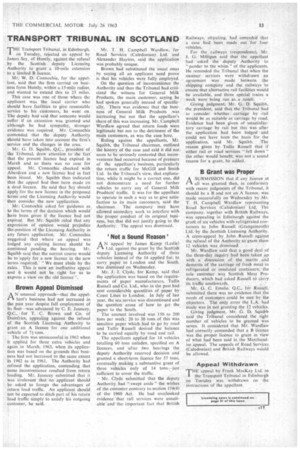Not a Sound Reason' A N appeal by James Kemp
Page 15

If you've noticed an error in this article please click here to report it so we can fix it.
(Leslie) Ltd_ against the grant by the Scottish deputy Licensing Authority of three vehicles instead of the 14 applied for, to carry paper to London and the South, was dismissed on Wednesday.
Mr. J. J. Clyde, for Kemp, said that the application was based on the requirements of paper manufacturers, Tullis Russell and Co. Ltd., who in the past had sent considerable quantifies of paper by Coast Lines to London. In July of last year, the sea service was discontinued arid the question arose of how to get the paper to the South.
The amount involved was 150 to 200 tons per week; 20 to 30 ions of this was sensitive paper which had to go by road and Tullis Russell desired the balance to be carried equally by road and rail. .
The appellants applied for 14. vehicles totalling 60 tons unladen. specified on A licences, and after two hearings the deputy Authority reserved decision and granted a short-term licence for 57 tons, eventually making a substantive grant of three vehicles only of 14 tons—just sufficient to cover the traffic.
Mr. Clyde submitted that the deputy Authority had "swept aside" the wishes of the customer contrary to.section 174(4) of the 1960 Act. He had overlooked evidence that rail services were unsuitable-and the. important fact that British
Railways. ohjecting, had conceded that a case had been made out for four vehicles.
For the railways (respondents), Mr. J. G. Milligan said that the appellant had asked the deputy Authority to " pander to the whim' of the applicants. He reminded the Tribunal that when the steamer services were withdrawn an agreement •was made between the shipping company and the railways to ensure that alternative rail facilities would he available, and three special trains a
week were being rim as. a result: Giving judgment, Mr. G.D. Squibb, the president, said that the Tribunal had to consider whether carriage by rail would be as suitable as carriage by road. Evidence had been given of unsatisfactory carriage by rail but this was after the application had been lodged and could not have been the basis for the application, said Mr. Squibb. The reason given by Tullis Russell that if either rail or road services "fell down " the other would benefit, was not a sound reason for a grant, he added.




































































































